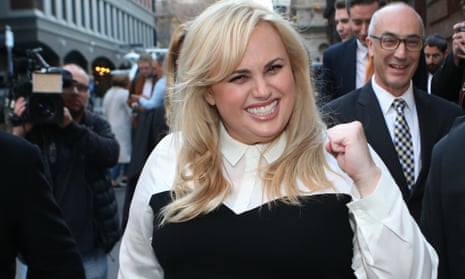Major Australian media companies have lined up with the magazine publisher Bauer in its appeal against the record amount of damages awarded to actor Rebel Wilson last year.
The payout of $650,000 in general and aggravated damages and $3.9m in special damages was the biggest defamation win in Australian legal history, but is now subject to appeal by the publishers of Woman’s Day and the Australian Women’s Weekly.
On Monday News Corp Australia, Fairfax Media, Macquarie Media, the ABC and the Seven and Nine networks asked the Victorian appeal court for leave to intervene, in an effort to prevent defamation payouts escalating.
The media companies are worried the decision to award Wilson $650,000 in general and aggravated damages – when general damages are supposed to be capped at $389,500 – will lead to plaintiffs seeking ever higher payouts.
The lawyer for the joint media group, Justin Quill from Macpherson Kelley, said the rare move was triggered by the media’s desire to protect free speech and to keep legal costs from spiralling out of control.
“The media parties seeking to intervene in the case are seeking a ruling that the damages cap – currently at $389,500 – applies to any award of general damages even if aggravated damages are awarded separately,” Kelley told Guardian Australia.
“Media organisations regularly join forces on matters of extreme public importance. An example of that would be when they band together to fight suppression orders, which regularly happens. But it is rare for media companies to come together in a defamation action.”
In their affidavit the parties said they were concerned the Wilson decision would “remove the certainty otherwise provided by the statutory cap on damages”.
In the short months since the decision by Justice Dixon in the Victorian supreme court, plaintiffs were already relying on the Wilson decision to claim that they were no longer constrained by the statutory cap.
Dixon ruled that Wilson was entitled to a substantial payout because the damage to her reputation from the Australian articles in Hollywood was unprecedented.
Wilson, who was accused in a series of articles of being a serial liar about her age, real name and childhood, has said she would not be keeping any of the money.
“The jury found each of the articles was defamatory, and rejected the defendants’ triviality defences,” the judge wrote in his judgment. “The sting was serious, likely to be injurious and understood as such by the defendants prior to publication.
“I do not accept that the articles were published for a local Australian audience. The internet cannot be so classified. ”
